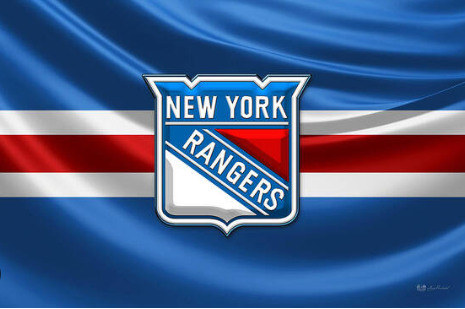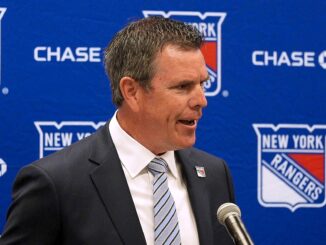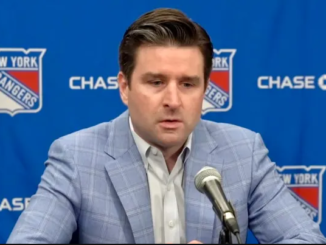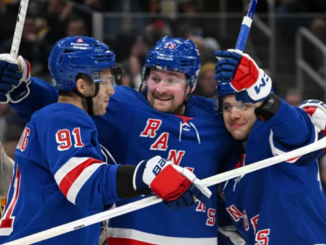
The New York Rangers have some critical decisions to make soon, with none more significant than the future of star goalie Igor Shesterkin, who will become an unrestricted free agent next offseason.
Shesterkin is one of the top goalies in the NHL and the cornerstone of a Rangers team that has reached the Eastern Conference Final twice in the past three seasons and won the Presidents’ Trophy in 2023-24. The two-time All-Star won the Vezina Trophy in 2021-22 and boasts a .921 save percentage and 2.43 goals-against average in 213 NHL games, with an impressive 135-59-17 career record. He’s been even more outstanding in 44 Stanley Cup Playoff games, recording a 2.41 GAA and a franchise-best .928 save percentage when it matters most.

Given these credentials, Shesterkin’s contract demands are understandably high. The key question is whether he will insist on a reported 14 percent of the cap ($12.9 million AAV) or if he will consider a pay cut similar to Jalen Brunson’s to help strengthen the rest of the team.
Igor Shesterkin's camp wants 14% of the expected $92M cap, which would equate to $12.9M AAV, per Larry Brooks
woah. #NYR pic.twitter.com/tMrWSoUl8s
— me (@nyronly) June 29, 2024
Should Rangers make Igor Shesterkin highest-paid goalie in NHL history?
Forever Blueshirts writers Lou Orlando and Nick Palmer debate whether the Rangers should meet Shesterkin’s contract demands.
LO: Offering players a blank check isn’t wise, but Shesterkin might deserve it. No player is more critical to the Rangers’ success, especially in the postseason, than Igor. While he hasn’t led them to a Stanley Cup Final yet, his performance was crucial in reaching the Eastern Conference Final in 2022 and 2024. In both trips, he ranked first or second in GSAA among postseason goalies. Even in the 2023 first-round exit, he finished second in GSAA despite only playing seven games. When the team struggles, Shesterkin remains a reliable force. Although $12.9 million AAV is high, losing Shesterkin would be costlier.
NP: Shesterkin is essential for the playoffs, but is it wise to invest so heavily in him? The Rangers haven’t made it past Game 6 of the Eastern Conference Final with him, though this isn’t his fault. Sacrificing future flexibility for an enormous goaltending contract may not be prudent. Many recent Stanley Cup winners have had modestly paid goalies, like Jordan Binnington, Adin Hill, and Darcy Kuemper. Shesterkin’s potential $12.9 million AAV would make him the highest-paid goalie, yet it wouldn’t necessarily bring the Rangers closer to a Cup.
LO: $12.9 million is a lot, but it might not be as crippling as you think. The cap is expected to rise significantly, and while it would strain the 2025-26 budget, it shouldn’t handcuff Drury from building a competent roster. Investing in Shesterkin, a consistently elite goalie, seems wise. Such goalies are rare and invaluable. For every modestly paid Binnington or Hill, there’s a high-paid Vasilevskiy or Quick crucial to their teams’ success. The Rangers should aim for $10-11 million annually but may need to accept $12.9 million for such a key player.
NP: Elite goalies are rare, but the Rangers must consider cap maneuverability. Trouba’s $8 million and Zibanejad’s $8.5 million contracts already limit flexibility. Adding another hefty contract could hinder future roster construction. The Rangers need a balanced lineup to avoid potential slumps. Past big contracts, like Lundqvist’s, didn’t guarantee a Cup. Maintaining flexibility and investing in a well-rounded team might be more effective.
LO: Rangers fans know the value of an elite goalie from Lundqvist’s era. Despite the challenges, his presence always gave the team a fighting chance. Big contracts necessitate shrewd spending elsewhere. Drury has found success with bargain signings, and the Rangers have promising young talent. With the window closing for this core group, the focus should be on winning now. Aiming for a Cup requires investing in Shesterkin, even if it means financial challenges down the road.
NP: The window is closing, and Shesterkin is crucial now. But what if they don’t win in the next two years? The Rangers could face a rebuild with an expensive Shesterkin. Aging stars like Zibanejad and Kreider will soon need replacing. Relying on young prospects is risky. If the team fails to remain competitive, they might end up with an elite goalie but limited cap space for necessary reinforcements. Balancing immediate goals with future flexibility is crucial for sustained success.



Be the first to comment